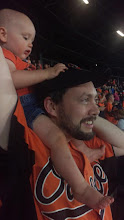I always thought that
Donn Clendenon's first name was unusually spelled, and assumed it was just an idiosyncratic nickname. I have a friend named Donald, who used to go by Donn, but eventually dropped the extra "n". However, Clendenon's birth name is actually Donn. Go figure.
Though he was born in Neosho, Missouri, Clendenon grew up in Atlanta. He was a gifted scholar and athlete, graduating second in his high school class and earning twelve letters in baseball, football, and basketball at Morehouse College. Though he had a greater interest in the latter two sports and received offers to play for the Cleveland Browns, New York Knicks, and Harlem Globetrotters, Donn signed with the Pirates in 1957 for a $500 bonus. A primary factor in his decision was his respect for his stepfather Nish Williams, a former Negro League catcher and manager who had a real love for the game.
After a nine-game trial late in 1961, Donn was eased into the lineup the following year at first base and in right field. He hit .302 with 20 of his 67 hits going for extra bases, and swiped 16 bases. He received the single vote for N.L. Rookie of the Year that did not go to the winner, Cubs second baseman Ken Hubbs. But the young Pirate would become a steady and productive hitter for his club throughout the 1960s, increasing his RBI total each year from 1962 (28 in 222 AB) to 1966 (a career-high 98). He socked double-digit home runs for nine straight seasons, back when that meant something. In 1965 and 1966, the first baseman went even further, reaching double digits in doubles, triples, and home runs (32-14-14 and 22-10-28, respectively). As with most hitters, his production dropped at the end of the decade, but he was the leading RBI man for the Bucs in 1968 with 87.
At the end of that 1968 season, Clendenon found himself separated from the team that had brought him into pro baseball some twelve years earlier. The Montreal Expos claimed him in the expansion draft, but almost immediately traded him to Houston along with Jesus Alou in exchange for Rusty Staub. For whatever reason, Donn did not want to play for the Astros, and refused to report to the club. In a canny and significant move that foreshadowed Curt Flood's challenge of the reserve clause, he claimed that he had retired. Commissioner Bowie Kuhn intervened and ruled that the trade would stand, with Houston accepting two pitchers and $100,000 compensation in place of Clendenon. He began the season in Montreal, but was still traded later in the year to the Mets in a crucial acquisition for the future World Champs.
Donn gave his "Amazin'" new team an infusion of calm veteran presence and power hitting, clubbing a dozen home runs in 72 games. But he saved his best for the World Series, batting .357 and leading the Mets with three home runs and four RBI as the all-too-recent laughingstocks of baseball shocked the powerhouse Orioles and the rest of the world. He was named Series MVP.
Though New York slipped to third place in 1970, Donn had one of his best efforts, clocking in at .288 with 22 home runs and a team-high 97 RBI. But that was a last hurrah for the veteran, as he saw his playing time nearly halved the next year. After struggling in a reserve role with the 1972 Cardinals, Clendenon called it a career. He finished with a .274 career average in twelve seasons.
Not content to be defined as an ex-athlete, Donn found a new calling by earning a law degree from Duquesne University. He worked at law firms in Washington, D.C. and Chicago, and battled with drug addiction, eventually rehabilitating at a facility in Ogden, Utah. Afterward, he continued to practice law in Sioux Falls, South Dakota and became an addiction counselor. In September 2005, Clendenon passed away at age 70 after a lengthy battle with leukemia.
Fun fact: As of 2008, Donn is still the only graduate of Morehouse College to ever play in the major leagues.




I loved the old cards and their cute and silly comments with period animation! There was always something to say about even the most menial player of the time. "Pete likes to collect butterflies" might be the desperation comment.
ReplyDeleteI think the 1965 and 1966 Topps sets might be my all-time favorites.
ReplyDeleteDonn didn't want to go to Houston because Harry Walker was managing there, and the two had had personality clashes when Walker managed Pittsburgh.
ReplyDelete